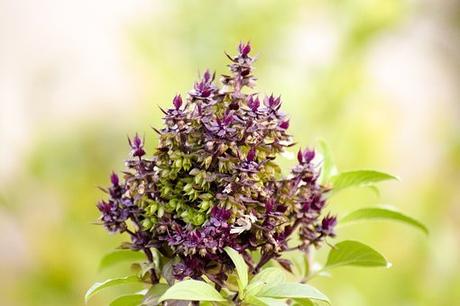TULSI (HOLY BASIL), A PLANT WITH MIRACULOUS PROPERTIES

Beneficial properties for health
Tulsi also called "holy basil", is an Ayurvedic plant native to India, where it is considered a sacred plant. Despite being a close relative of "gastronomic basil", it is a completely different species with different medicinal properties.
Holy basil, revered for its extraordinary healing properties, has been used in Ayurvedic medicine for thousands of years and is one of the most treasured plants in India.
More holy basil or Tulsi tea is consumed than coffee in India. It is an energy drink used by the Ayurvedic method in the treatment of lung and heart problems, digestive disorders, mental disorders, colds, headaches, and inflammatory processes.
Beneficial properties of holy basil
Holy basil or Ocimum sanctum has antiviral, adaptogenic, immune-modulating, and antibacterial properties, and is particularly effective in treating problems of the digestive, respiratory, and neurological systems.
Beneficial properties of Tulsi as an adaptogen
Tulsi is a recognized adaptogen and contains a multitude of phytochemicals that act synergistically to strengthen the body's defense mechanisms against stress and disease. Adaptogens help counteracts the harmful effects of stress, reinforce the natural response of the immune system, contribute to the normalization of the body's functions and achieve all this by providing nutrients to the nervous system, as well as other adaptogens that contain triterpenes, such as ginseng, eleuthero, and reishi.
Tulsi has a natural energizing effect on the body, although not caffeine and is considered a stimulating herb. It is interesting to note that when you prepare an infusion, some varieties turn dark brown, very similar to the color of coffee. It is reputed to be a good substitute for coffee or caffeinated teas, for people who want to reduce their consumption of this substance.
The beneficial properties of holy basil as an adaptogen make it a powerful modulator of the immune system, balancing and enhancing the body's immune response when fighting antigens such as bacteria, viruses, microbes, and allergens.
Respiratory system
It can be used to both prevent and treat upper respiratory viruses, such as colds and flu. It is an expectorant herb especially indicated for lung problems and has been used since ancient times in the treatment of bronchitis and pulmonary fatigue.
Its continued use over time can have beneficial effects against asthma and it has also been proven to be effective in alleviating the symptoms of allergic processes and hay fever.
Tulsi infusion contains a large number of bioavailable antioxidants that help to strengthen the immune system and protect our cells from the damaging effects of free radicals, serving as a shield for the cellular structure against "germs" and other invading exogenous agents that threaten our health.
Anti-inflammatory properties
The anti-inflammatory effects of holy basil have been duly demonstrated in various studies that prove its anti-inflammatory properties and its effectiveness in modulating both cellular and humoral immunity. Its efficacy has recently been proven against inflammatory processes, liver disease, and gastric ulcers ”.
Beneficial effects of Holy Basil
In India, Tulsi is considered to be a very effective means of achieving mental acuity in meditative states and when an over-effort of both the heart and the mind is required to achieve Bhakti, or "love and devotion." Stimulates compassion, faith, and discernment.
That is the reason why Tulsi is similar to other tonics such as reishi, Shatavari, and asparagus root in its ability to act as a heart-mind connecting bridge, and serves to open us to greater heights of feelings of love.

A sacred plant in the Hindu religion
In the Hindu religion, holy basil is revered as a holy herb for meditation, rituals, and prayer. It is often symbolically planted at the entrance to Hindu homes or in their courtyards and its seeds can be worn on clothing in honor of the goddess Vishnu or Krishna.
The properties of Tulsi help to:
- Promote energy and stamina
- Stimulate the mind
- Balance cholesterol levels
- Maintain eye health
- Protect metabolism health
- Normalize blood sugar levels
- Relieve and protect us from daily stress
- Strengthen the immune system
- Sharpen awareness and increase the mental perception
How to prepare a Tulsi Tea
Tulsi has a distinctively spicy flavor, with a hint of a mix of mint, licorice, and cloves. The leaves of holy basil contain essential oils that add fragrance to its refreshing taste. Tulsi tea is made with the leaves of the plant, and the traditional way to prepare it is to make an infusion with the fresh, dried or powdered leaf and hot water (1 teaspoon for each cup of boiling water), strain it, and enjoy. It can be served cold or hot, like tea, alone or with other herbs or spices such as ginger, cinnamon, coriander, or anise, and it can be sweetened with honey.
Precautions :
Tulsi tea or holy basil is not recommended during pregnancy or convalescence. Tulsi may have mild anticoagulant properties. Check with your doctor, if you are under prescription.
ORIGINALLY WRITTEN BY - FITNESS YODHA

